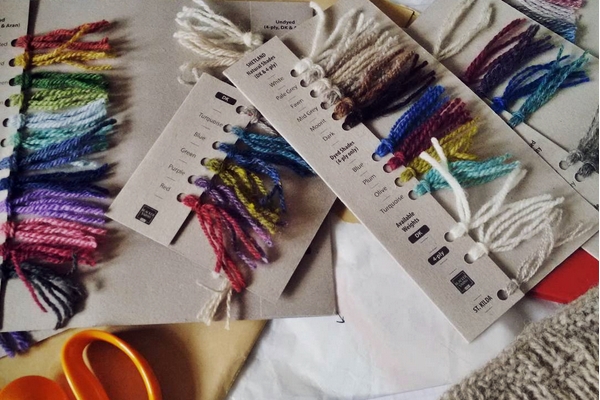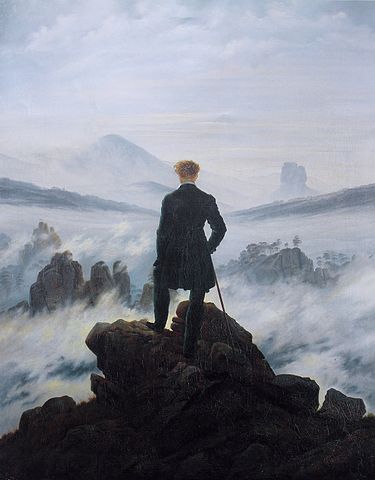Working With Creativity: 6 Tips From My Inbox
 The second post in an accidental series on working with your creativity. Thank you for your feedback! The first post was about finding inspiration and taking hold of your own ideas. This post is derived from numerous email conversations I have had over the years. Grab a cuppa and let's go!
The second post in an accidental series on working with your creativity. Thank you for your feedback! The first post was about finding inspiration and taking hold of your own ideas. This post is derived from numerous email conversations I have had over the years. Grab a cuppa and let's go!
1) I am not creative but would love to know how I become one.
I believe that we are all born creative beings but somewhere along the way, some of us lose confidence in our own creativity. One of the defining things about us humans is that we make stuff. Look at us! We made fire and flint tools; now we land tiny machines on comets!
Do you cook? Do you bake? Do you garden? You are creative.
So, your job is actually to allow yourself to play and make stuff just for the sake of making. Get in touch with your younger self who told herself stories whilst playing. Make time to faff about.
2) I am really creative but things never look like they are supposed to. What am I doing wrong?
This is a really big question.
First of all, I hear you: I have all these ideas in my head and they rarely come out looking like what I expect. That is a perfectly normal phenomenon - so normal that it was discussed many thousand years ago by the famous Greek philosopher Plato in his Allegory of the Cave. So, be kind to yourself and look at your creative project with an objective eye. So, it doesn't look like it's supposed to but does it look like something else that is just as great?
Secondly, there is something to be said about practising your skills and knowing the tools of your craft. It is pretty straightforward: if you are an excellent cellist, you will find it easier to write a great piece for cellos; If you are a skilled lace knitter, you will find it easier to design a lace pattern; If you are a writer, having a good vocabulary helps you write characters who sound like actual individuals.
In summary: be kind to yourself but also acknowledge when you need to brush up on skills.
3) I'm a writer & designer, but I'm yet to write & design anything. Can you help me get started?
Some tough love: if you don't write or design, you are not a writer or a designer. Simple as that. I used to date someone who called himself a writer but he had never written anything. It was all in his head. Unless you get the words out of your head and on to paper (or screen), it doesn't count.
Some less tough love: I am a creative and I know all about fear and how easy it is not to do anything - your brain will give you a tonne of reasons why it's easier not to create. My personal demon is how nothing I create will ever measure up to the ideal version in my head (see above!). When I get a visit from that particular thought, I sit down and play. I doodle and I play around with scraps of art material. And then I get on with things. Months later I will look back at things I made and wonder why I ever found them troublesome and imperfect.
The best way to get started is to sit down and make some stuff. It doesn't need to be Pride & Prejudice, Mona Lisa, or the most elaborate cabled cardigan ever - you just need to get started. It gets easier.

4) Where do you find inspiration? What books can you recommend?
You need to hunt your own narwhals. Find out what is specific to you and your interests. In the words of a (not very good) 1990s British song: I got to be myself/ I can be no one else..
Try narrowing down who you are as a creative being and what you will mine for inspiration. Essentially, it is not about finding a lot of influences that look great on paper. You need to nail down who you are because it makes creative decisions a lot easier.
I'll use myself as an example: I like art, music, books, history, culture and films. Pretty generic, huh? I like early 20th century avant-garde art, Antipodean weird pop music, TS Eliot, prehistoric archaeology, print culture (particularly early printing), and the film director Todd Haynes. Looking closer, all these things/people seem to inhabit a place of instability and societal shifts. That's a pretty rich seam to mine from a creative point of view. It also means that I can easily identify what aligns with my values and my skill set. I'd be so bad at designing a collection of baseball-inspired sock patterns!
The only piece of advice I can give is that you should try to look outside your particularly creative field. If you are into knitting, get really good at knitting but also keep tabs on other creative fields, read about other interests, and listen to podcasts about deep sea exploration (or whatever). The author Vladimir Nabokov was obsessed with butterflies, the poet Emily Dickinson was allegedly a passionate baker, and the actor Vin Diesel loves table-top gaming.
Who are you as a creative? What makes you you as a maker?
5. What tools do I need to get started? What do you use?
Many people love having beautiful, expensive tools and they have elaborate rituals that help them in their creative work. But I am going to give it to you straight: a £50 journal, six types of washi tapes, three expensive pens, and the perfect mug will not make you a writer, designer, or artist. These things may make you feel you are settling into a creative space - which can be very helpful - but the starting point is always your own imagination.
(Having said that, I do love stationery as much as everyone. I even have washi tape in the house, but I mainly use it for taping up sprained fingers.)
I like uni-ball rollerball pens - they are easily available, feel good in my hand, and not so expensive that I'll cry if I forget one on a train. I use small journals: unlined for sketches and general mindmapping; squared for quick charting and schematics. I use Scrivener for writing, Open Office for spreadsheets and databases, Stitchmastery for knitting charting (Crochet? Google is your friend) and Scribus for general layout. You need to figure out your own configuration and (this is crucial) you need to learn how to use the software programmes, so they become helpful tools rather than something that stops you making.
Remember: Your imagination is the important thing. You cannot buy that.
6. Best advice ever for a wanna-be creative?
Butt, meet chair.
Sit down and do it, in other words. Don't wait for inspiration. Make inspiration come to you. The more you are sitting in that chair working away, the more likely it is that you will have a brilliant idea. The idea of floating about your life waiting for inspiration to hit is a terrible notion brought to you by Romanticists who were mainly aristocratic wastrels floating around high on opium. So, don't do that.
Do this: Butt, meet chair.
---
I occasionally teach classes on designing, creativity and how to move from vague ideas to full-blown project. Keep an eye on my workshop schedule if you are interested. Over the next few weeks, I'll be adding other blog posts on working with creativity and various aspects.